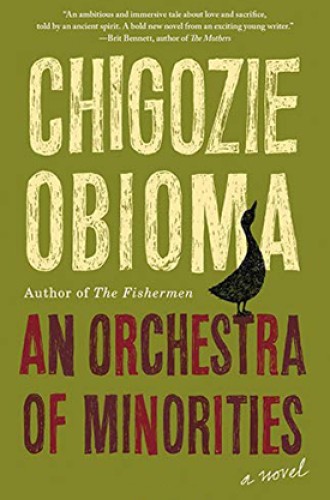Chigozie Obioma’s novel is at its core a tale of star-crossed romance, of one man’s subjection to a spiral of injustices encountered in his fight for the woman he can’t live without. But the account of Chinonso Solomon Olisa’s misfortunes is more than an ill-fated love story: it offers an exploration of natures both human and divine.
Chinonso’s tale is delivered by his chi—his attending spirit, simultaneously an invisible companion and an inherent part of himself. The chi has come before Chukwu, the creator, to explain and defend his host’s actions. The account begins by describing how Chinonso met Ndali, the woman who has inspired his endeavors. Only a long while after preventing Ndali, a stranger, from throwing herself from a bridge does Chinonso meet her again by chance. They come quickly to know and love each other. But Ndali’s wealthy family objects to her relationship with this uneducated poultry farmer and spares no means of humiliation in attempting to end it. Chinonso continues to try to prove his worthiness, allowing a childhood classmate to arrange for him to attend college in Cyprus. The criminal indignities he endures there, and later on his long quest to return to Ndali, bring to the story reflections on suffering, injustice, guilt, vengeance, and the order of the cosmos.
Read our latest issue or browse back issues.
These reflections come courtesy of Chinonso’s chi, whose observations, delivered in the court of the gods, often feel as if they come straight out of the simile and metaphor of wisdom literature or ancient mythology. “The peace that concrete hope brings,” he pronounces, “is the unseen hand that lifts a man off a cliff over a pit of fire and returns him to the road from which he has veered. It is the rope that pulls a drowning man out of the deep sea and hauls him onto the deck of a boat to the breath of fresh air.” The particularities of Chinonso’s case inspire the chi to reflect upon the nature of humans and the structure of the universe, knowledge that has been gleaned from centuries’ worth of lives lived along with his various hosts. It’s less the content of these speculations that’s intriguing than what they reveal about the chi: that he doesn’t necessarily possess any more knowledge, insight, or common sense than his host and that he’s had to learn what life is about in the process of living it. Neither omnipotent nor all-knowing, with only limited capabilities for suasion and action, even after all he has seen, Chinonso’s chi still encounters things that puzzle and astound him.
Chinonso’s chi has an experience in Cyprus that challenges the idea of a single, unified heavenly realm where order and custom reign above the diverse chaos of earthly life. After the chi has left his sleeping host’s body and entered the local spirit world, he says of the other chis who are there: “What was most shocking for me was the paucity of these creatures.” These spirits, he notes, “sought dwellings like those of men.” Indeed, inhabitants of the spirit world don’t all speak the same language and, as the chi discovers when encountering a Turkish counterpart, are just as unable to communicate as are their human hosts.
The spirits’ realm is no peaceful bed of roses: even there, nations are separated by tradition and language, culture and practice. And it would seem that in requiring an account of human behavior, Chukwu himself is not informed about everything that happens in the world. These elements made the book refreshingly different from attempts to explain the horrors of a world controlled by an all-knowing, all-powerful, and all-loving deity. And the picture of the dedicated, but sometimes uncertain, chi is a gratifying contrast to the treacly images of protective angels often found in contemporary culture.
Filled with ruin and broken trust, Chinonso’s story also confronts the possibility of forgiveness: what it is, when it’s deserved, and how one might earn it. The book demands something more than a categorical command to forgive without question anyone who’s wronged us. Forgiveness is no light matter in this novel; not even Jamike, the enemy-turned-penitent, has an easy time of making amends. After he unexpectedly meets and asks Chinonso for forgiveness, a stunned Chinonso grants it. Jamike then assumes everything’s been resolved. But Chinonso comes to his senses, and it’s clear that the story—and the atonement—are far from over. Jamike’s path of redemption, on which he remains long past most people’s endurance, contrasts with the limp apology of the German-Turkish woman who caused Chinonso years of suffering. Her lawyer’s plea, “She sorry, very sorry, my friend. Please, Mr. Ginoso, you must accept her sorry,” was apparently all anyone believed was required to let everyone go on with their lives.
Even after sifting through all that’s happened to him and recognizing that his onetime enemy has done everything to try to right his wrongs, Chinonso may not know whether it’s truly possible to forgive or atone for some things. The story resembles a contemporary reenactment of the Job myth, making sure this time that no one is left with the impression that the biblical character stayed silent and patiently bore his lot, or that a person can truly get back everything he’s lost and be satisfied with how things have turned out.
This compelling novel leaves open the question of how or whether the minorities—here, the powerless who can do nothing in the face of injustice but add their voices to a collective wail—can ever hope to see a better world. Whether or not it’s any comfort to them, in the book’s universe, they are at least not without champions—even if those advocates, human or divine, can only go so far in shielding them from the world’s ills.






